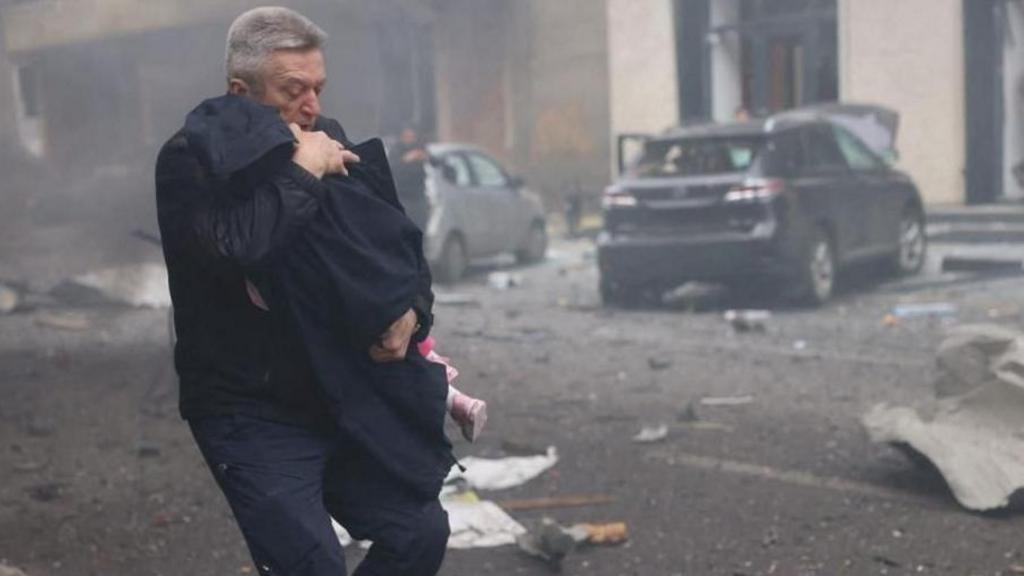Oleksandr Volobuev, his body turned slightly away from the camera as if to shield himself from the hazardous air still thick with debris and smoke, moves forward.
The Major-General from Ukraine’s Civil Protection Service, face etched with concentration, clutches a precious bundle wrapped protectively in his coat, from which two small pink shoes peek out.
This compelling image captures a dramatic rescue at a nursery school in Kharkiv, a city in eastern Ukraine, following a devastating direct hit by a Russian drone.
Unsurprisingly, the photograph has resonated deeply, captivating both the Ukrainian people and the global community.
With 48 children trapped in a shelter within the burning building, it was just one of many acts of bravery that day.
However, few photographs so powerfully illustrate the escalating impact of Russia’s full-scale invasion on everyday life, where Ukraine’s most vulnerable, including children, are bearing the brunt.
“We received a call about the attack on the kindergarten,” Oleksandr Volobuev recounted. “Knowing there were children there, we immediately set off, deeply concerned.”
Little did he anticipate that by day’s end, carrying that little girl to safety would elevate him to the status of a national hero.
In a fleeting moment immortalized on camera, the Ukrainian populace witnessed not only the reality of Russia’s evolving strategy – its increasing assaults on civilian infrastructure – but also a poignant depiction of their own resilience and defiance.
The reason why the Honey Academy, housed in a robust two-story brick structure in Kharkiv’s Kholodnohirsky district, became a target for a Shahed drone remains unclear.
The ominous hum of these Iranian-designed weapons, each carrying a lethal 50kg payload, has become a chillingly familiar sound, not just for soldiers on the front lines, but for Ukrainians across the nation.
While possessing devastating accuracy, the sheer volume launched by Russia – in multiple waves of attacks targeting cities nationwide – means that malfunctions are inevitable.
Russia has consistently denied targeting residential areas; however, city maps reveal no apparent military installations in the immediate vicinity of the kindergarten, leading the Ukrainian government to denounce the strike as deliberate.
“There is no justification for an attack on a kindergarten, nor can there ever be,” President Volodymyr Zelensky stated shortly after the incident. “It is clear that Russia is growing more brazen.”
Fedir Uhnenko was also part of the emergency response teams dispatched to the scene.
As a press officer with the Civil Defence Service, he typically does not participate directly in frontline operations.
However, witnessing the unfolding catastrophe compelled him to act.
“There had been a huge explosion, and their eyes reflected pure horror,” he shared, describing his encounter with the children huddled in the building’s basement.
Fortunately, the children had sought refuge in the school’s shelter following the air raid siren sounded prior to the attack.
Yet, with the fire still raging, the roof destroyed, and the building filling with smoke and dust, their lives remained in peril.
His colleagues, along with civilians who had arrived to help, stepped forward to carry the children to safety, one by one.
Like his superior, Oleksandr, Fedir was photographed carrying a child – a young boy – through the debris and smoke.
“Throughout the entire ordeal, I reassured him that everything was alright, that there was nothing to worry about,” he explained.
“When we emerged from the building, a car was ablaze. Our team was extinguishing the flames. It surprised me that the boy didn’t cry, though fear was evident in his eyes.”
“I told him to hold on as tightly as he needed. I’m a big guy, and as you can see in the photo, he grasped me with all his strength.”
In the end, he fulfilled two roles: participating in the rescue and performing his job. His helmet camera, as a press officer, captured much of the footage that has since circulated globally.
The children were transported to an emergency reception area in a secure zone, several hundred meters from the nursery school.
All escaped unharmed, but the danger they faced was undeniable.
One adult working nearby was killed in the attack, and nine others were injured, one suffering severe burns and another a traumatic leg amputation.
For all the rescuers, Fedir explained, there was constant awareness of the risks posed not only by fire, falling debris, and smoke, but also the potential for a follow-up strike.
Russia has been known to target the same location twice, a tactic Ukrainians perceive as a deliberate attempt to kill emergency responders.
The day after the nursery school attack, one of these “double taps” claimed the life of a firefighter and injured five of his colleagues in a village not far from Kharkiv.
Ukraine believes Russia has resorted to attacking civilian targets out of desperation, due to its inability to achieve significant advances on the battlefield.
Oleksandr and Fedir both say that what they witnessed at the kindergarten has done little to soften their views of the enemy.
“From the beginning, I have had only one feeling: that we must endure all of this and emerge victorious,” Oleksandr stated.
I asked him about the future he envisions for the 48 young lives he helped save.
“Of course, only good, happy lives,” he replied. “But not just our children. I want all children to live in peace.”
The experimental weapon is hailed as having a potentially unlimited range – though Western experts have questioned its value.
A “coalition of the willing” meeting in London seeks to increase pressure on Russia to end its war in Ukraine.
The three men, aged 48, 45, and 44, were arrested at addresses in west and central London.
People are packing Christmas boxes for children in Ukraine and Moldova.
The prime minister is hosting Zelensky and the “coalition of the willing” at Downing Street on Friday.

